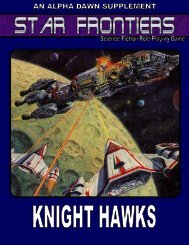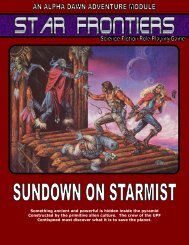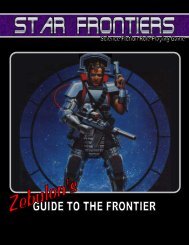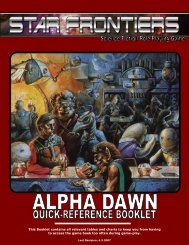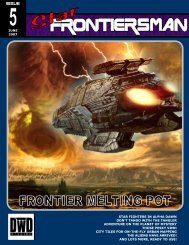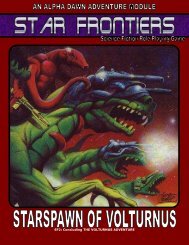Alpha Dawn - Star Frontiersman
Alpha Dawn - Star Frontiersman
Alpha Dawn - Star Frontiersman
Create successful ePaper yourself
Turn your PDF publications into a flip-book with our unique Google optimized e-Paper software.
differently. It is your job to determine how each<br />
character would react in a situation. Encourage the<br />
players to talk to you as if you were the characters<br />
they meet and answer them as each would.<br />
For example, the player characters are trying to find<br />
someone who might know something about a<br />
missing PGC scientist. They want to question several<br />
NPCs who were in the area when the scientist<br />
disappeared. One is an old woman whose mind<br />
wanders and who never quite answers the<br />
questions. Another fellow has had too much to drink<br />
and wants the players to drink with him. The third is<br />
a bully who won't help anyone and wants to start a<br />
fight. The last is a policeman who warns them that<br />
strangers are not liked here; but he does remember<br />
seeing the scientist with two people the night he<br />
disappeared. You can make up an entire, interesting<br />
dialogue as the NPCs talk to the player characters.<br />
Be a Leader. Make sure everyone participates. Give<br />
every player a chance to make decisions but don't<br />
let everyone talk at once. You might ask the group<br />
to choose one player to be its leader. When the<br />
players reach decisions, the leader explains their<br />
plans to you. This reduces the confusion that can<br />
result when everyone talks at once. When<br />
characters are acting independently, as in combat,<br />
you can ask each player what his character is doing.<br />
Make sure no one is forgotten.<br />
How to Control the Adventure<br />
As the referee, you must control many actions<br />
during an adventure. You must start the game and<br />
control the direction of the story; you must make<br />
decisions on special actions, determine any<br />
modifiers, decide on non-player character and<br />
creature reactions, conduct combat and keep track<br />
of time. Advice on handling each of these tasks is<br />
given below.<br />
You start a game by telling the players the<br />
background of their mission, describing the setting<br />
and discussing how much they will be paid if they<br />
succeed. Be prepared to answer any questions and<br />
give further descriptions as the players investigate.<br />
Let the players make their own decisions and try not<br />
to force choices on them. If they make a bad choice<br />
or bypass an encounter, let them; they may return<br />
to the encounter later. What you should try to do is<br />
make sure players understand what effects their<br />
decisions might have.<br />
Make Decisions. During the adventure you must<br />
decide what happens when characters try unusual<br />
things, and how likely they are to succeed. This<br />
might include deciding whether a building blows up,<br />
or if a skimmer is damaged by driving across a<br />
rocky field. You may have decided before the game<br />
what will happen when certain things are done, or<br />
you may have to make a decision during play. Your<br />
decisions should be based on what you think would<br />
happen in real life. A character who tries to leap<br />
from one roof to another may make it, but if he fails<br />
he probably will fall and get hurt.<br />
If a character tries an unusual action, you probably<br />
can link his chance to succeed to one of his ability<br />
scores. Then you can have the player make an<br />
ability check to see if the character succeeds in his<br />
attempt. If an action can not be linked to an ability,<br />
you should just assign a percentage chance from 1<br />
to 100, based on how likely you think the action is<br />
to work.<br />
When players ask if they can do something, don't<br />
answer them "yes" or ''no." Tell them to try and see<br />
what happens. Letting players try anything will<br />
make the game more unpredictable and full of<br />
surprises for everyone.<br />
Most important, you should make your decisions<br />
quickly. It is more important to keep the adventure<br />
moving and the players interested than to consider<br />
every possibility.<br />
Using Modifiers. As referee you will need to<br />
determine how easy or difficult an action is and how<br />
this will affect a character's chance to do something.<br />
You must use modifiers to reflect the difficulty of an<br />
action. If an action is easy you can let the player<br />
add 5 to 30 points to his chance of success; if it is<br />
difficult, you could tell him to subtract points.<br />
To determine whether a character should get a<br />
positive or negative modifier, you can compare the<br />
action being attempted to the character's normal<br />
limits. For example, a character can leap 5 meters<br />
with a running start. If a character tries to leap 5<br />
meters without a running start or with a heavy pack<br />
on his back, his chance to succeed should be<br />
reduced. If the character is jumping with a strong<br />
wind at his back or from a higher to a lower surface,<br />
his chance to succeed should be increased.<br />
Your own judgment is very important when deciding<br />
whether to assign a modifier, but you always should<br />
have a reason for choosing the modifier you<br />
assigned.<br />
NPC Reactions. You will need to decide how nonplayers<br />
characters and creatures react to player<br />
characters when they are encountered. NPCs should<br />
act intelligently and react according to their<br />
personalities (are they friendly, suspicious or<br />
hostile) and on the basis of what they know and<br />
how the characters act. Creatures usually react<br />
according to their instincts and the characters'<br />
85



